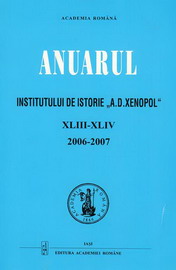Interferenţe politice germano-române în timpul primului război balcanic (1912-1913)
German-Romanian Political Interferences during the First Balkan War (1912-1913)
Author(s): Claudiu-Lucian ToporSubject(s): History
Published by: Editura Academiei Române
Keywords: South-East of Europe; boarders; First Balkan War
Summary/Abstract: The First Balkan War (1912-1913) represented a turning point for the evolution of reports between Germany and Romania. The events in this period have brought into Germany’s attention the political problems from the South-East of Europe and thus Romania gained a privileged position in diplomatic projects from Berlin. At the beginning of the Balkan War, in the autumn of 1912, the diplomatic position from Bucharest was important for Germany’s politics only in what regards the cooperation with Austro-Hungary. With the new political complications that appeared through the changing of boarders in the Balkans, Romania became an essential factor for the German interests in Eastern side of Europe. Germany supported the Romanian diplomacy both during the Conference of ambassadors in London and the winding evolution of the argument over Bulgarian border. German government and the emperor Wilhelm II sustained the idea of a new Balkan League between Romania, Serbia, Greece and Turkey. The history of relations between Romanian and the powers of Triple Alliance have changed for the first time in 30 years. The interests of the government in Bucharest have crossed with the political priorities of the German Empire. Thus, only this way was possible the cooperation between the two friendly nations. The present study is dedicated to understand the nature of political interferences between Germany and Romania during the First Balkan War, immediate or long-term effects of this cooperation. At the end of our research we noticed that the complicated evolution of the Balkan War produced an unexpected renewal of the German-Romanian friendship and a steady degrading of the relationship between Romania and Austro-Hungary. Within the projects of “German inspiration” of Triple Alliance for the diplomacy from Bucharest was given the role of referee of the political situation on the South-East of Europe. Germany considered that Romania represented a powerful point in the Balkans. Starting with January 1913 until July 1914, German political initiative took into account this situation context.
Journal: Anuarul Institutului de Istorie »A.D. Xenopol« - Iaşi
- Issue Year: 2006
- Issue No: 43+44
- Page Range: 375-420
- Page Count: 45
- Language: Romanian

